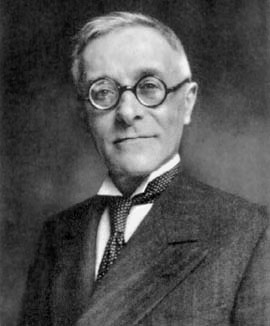Tullio Levi-Civita facts for kids
Quick facts for kids
Tullio Levi-Civita
|
|
|---|---|

Tullio Levi-Civita
|
|
| Born | 29 March 1873 Padua, Italy
|
| Died | 29 December 1941 (aged 68) Rome, Italy
|
| Alma mater | University of Padua |
| Known for |
|
| Awards | Sylvester Medal (1922) FRS (1930) |
| Scientific career | |
| Fields | Mathematics |
| Institutions | University of Rome |
| Doctoral advisor | Gregorio Ricci-Curbastro |
| Doctoral students |
|
Tullio Levi-Civita (born March 29, 1873 – died December 29, 1941) was a very important Italian mathematician. He is best known for his work on tensor calculus. This is a special type of math that helps describe things in a way that works no matter how you look at them. This math was super important for Albert Einstein when he created his theory of relativity.
Levi-Civita also made big contributions to other areas of math. These included celestial mechanics, which is about how planets and stars move. He also worked on fluid dynamics, which studies how liquids and gases flow.
Contents
Life Story of a Math Genius
Tullio Levi-Civita was born in Padua, Italy. His father was a lawyer and a senator. Tullio loved math from a young age. He finished his math studies at the University of Padua in 1892.
After teaching for a few years, he became a professor in Padua in 1898. There, he met one of his students, Libera Trevisani, and they got married in 1914. He later moved to the University of Rome in 1918.
Working with Tensors
In 1900, Levi-Civita and his teacher, Gregorio Ricci-Curbastro, published a major work on tensors. This book was a big deal! It became a key resource for Albert Einstein. Einstein used tensor calculus to develop his famous theory of general relativity. This theory explains how gravity works.
Levi-Civita and Einstein even wrote letters to each other. Levi-Civita found some math mistakes in Einstein's early work on relativity. He politely pointed them out. Einstein was impressed by Levi-Civita's careful work. He once wrote to Levi-Civita, "I admire the elegance of your method." This shows how much respect they had for each other.
Later Life and Challenges
Levi-Civita's textbook on tensor calculus is still used today. It has been translated into many languages.
In 1936, Einstein invited Levi-Civita to visit him in the United States. Levi-Civita stayed at Princeton for a year. But he returned to Italy when the risk of war grew.
Sadly, in 1938, new laws in Italy meant that Jewish people like Levi-Civita lost their jobs. He lost his professorship and his memberships in scientific groups. He passed away in Rome in 1941, isolated from the scientific world.
Despite these challenges, his work continues to inspire mathematicians. Einstein once joked that his favorite things about Italy were "spaghetti and Levi-Civita."
Other Discoveries and Awards
Levi-Civita studied many other math topics. He worked on the three-body problem, which tries to figure out how three objects in space move under each other's gravity. He also improved a math rule called the Cauchy–Kowalevski theorem.
He even helped with Paul Dirac's equations in quantum mechanics in 1933. He also developed something called the Levi-Civita field, which includes tiny, tiny numbers.
Honors and Recognition
Many important groups recognized Levi-Civita's amazing work.
- The Royal Society in London gave him the Sylvester Medal in 1922.
- They also made him a foreign member in 1930.
- He became an honorary member of the London Mathematical Society.
- He was also a member of the Accademia dei Lincei and the Pontifical Academy of Sciences.
See also
 In Spanish: Tullio Levi-Civita para niños
In Spanish: Tullio Levi-Civita para niños
- Levi-Civita connection
- Levi-Civita crater
- Levi-Civita field
- Levi-Civita parallelogramoid
- Levi-Civita symbol
Images for kids
 | Jackie Robinson |
 | Jack Johnson |
 | Althea Gibson |
 | Arthur Ashe |
 | Muhammad Ali |


